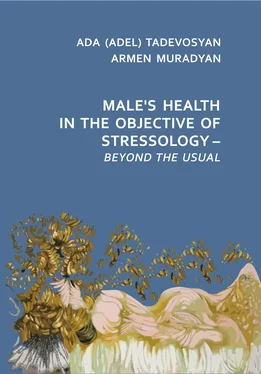The second type – is the so-called “standard events” – life stresses occurring within the regular life flow: entering higher educational institution, moving, marriage, birth of children, retirement. Such factors can go unnoticed, but can become pathogenic, stressful.
The third type is “non-standard events” – disease, psychic trauma, criminal prosecution, participation in combat operations. All these factors as a rule injure a person and can result in one of the versions of post-stress disorders.
The afore-mentioned factors that affect mental health are objective. But mental health of modern males is affected by much more subjective factors, such as “self-concept” and “self-control” or the ability to govern himself. People do not often ask themselves who they really are. Each considers his personal definition so natural that he cannot imagine to what extent everything he does (consciously and sometimes unconsciously) or how he percepts himself is conditioned by the conception that he created about himself.
On the example of some literary heroes, it is easier to understand what is being discussed. The Chekhov’s story “The Death of a Clerk” is about a poor clerk who accidentally sneezed in the theater on the bald head of the General sitting in front. Having apologized, he could not help thinking about that “shameful” fact and his whole life turned into sheer misery, which led him to death. Among the novels of Cervantes there is a story about the man who was sure that was made of glass. When somebody approached him he began to scream and pleaded to keep away so that not to break him by chance. He walked along the very middle of the street with fear looking at the roofs scared if a tile would suddenly tear off and fall on him. Once when a wasp sat on his neck, he did not dare either to hit or shake it off out of fear that he would break himself. He refused to have anything tough like meat or fish and going to bed wrapped in straw.
It is artistically exaggerated but a vivid example of the role of self-appraisal and “self-concept” in life, person’s behavior and activity. Mentally healthy people as a rule perceive themselves positively. They are able to aware and acknowledge their shortcomings, identify themselves, perceive their individuality. In their minds there is a temporary succession in the form of memories of the past, awareness of the present moment and look to the future. And they are able to overcome even seemingly impossible.
The brightest illustration to our narration about man as a volitional conscious and self-directed person can be the biography of the outstanding Austrian philosopher and psychologist Viktor Frankl. He appeared in a concentration camp almost of his own free will. Frankl, as a successful doctor-psychotherapist, could take an advantage of his American visa. But he remained in the Nazi Austria together with his parents and brother who did not have such a visa. As a result they all ended up in a concentration camp.

The Dachau Concentration Camp.
One day, Frankl completely exhausted walked through the snow, not feeling frozen legs and thought that that was the real end to everything. And then he, barely alive, created a situation in the head that clarified the meaning of all his previous and present sufferings: as if fellow-psychologists entrusted him with the task to conduct participant observationof the psychology of people in the concentration camp! And when this horror is over, he will report on this theme at the World Congress of Psychologists in a black suit and bow tie. And when he imagined this, he had strength to live on against all the odds. He survived and after the concentration camp he lived for more than fifty years, having become a truly world-famous psychologist and philosopher. And his book about the life in a concentration camp was declared by the USA Congress Library one of 10 books that had the greatest impact on Americans.
It is a vivid example of how a person, changing his view on “here and now”, looking at the situation from the other side, mentally constructing a new “psychic reality” is able to survive even in the hell. Perhaps more than once on the pages of this book we will repeat Frankl’s words “ If there is something to live for, one can bear any how ”. Often it is really impossible to change and leave the psychotraumatic situation, and then the only way is to create a favorable situation in your thoughts; to design a situation in which what is happening would have some meaning, at least the meaning of sacrifice “for someone, for something; to attach meaning to what is happening”.
The second important condition for mental health is the ability to control oneself – self-control. That is to control your thoughts, feelings and actions, not to yield to the power of your drives, desires or emotions, to keep them within the socially acceptable limits, to resist the pressure of others, to be able to establish and maintain relationships with surrounding people, to hold back angers, postpone funs if necessary. A common source of self-control violation is excessive excitement and strain, fatigue. Some people when experiencing violent anger, fright or enthusiasm have spasms, foam on the lips, involuntary urination, sometimes defecation. With the loss of self-control the memory does not fix person’s behavior and state, everything happens at an unconscious level, and therefore, a person does not remember what he did, when was “outraged”. Decline of self-control often occurs in conditions of collective excitation – in the crowd, in a riot, in mass panic. Strong emotional reactions remove self-control and increase person’s suggestibility. In a person who is not able to cope with internal strain, it can erupt like a volcano in the form of aggressive impulsive action. In a crowd people are so absorbed in each other and the object of hate that they lose personal identity and commit acts of unnatural inner “self” that later becomes a source of internal stress.
When determining mental health in each specific case, it is necessary to take into account peculiarities of ethnic culture, existing customs, religious orientation, behavior patterns of the society, age, situation. “You can diagnose a broken leg not knowing the patient’s cultural background, but to call the Indian boy psychopath because he says that has visions in which believes is a great risk. In a peculiar Indian culture the ability to experience visions and hallucinations is considered as a special gift, blessings of spirits and the ability to summon them is deliberately stimulated as something attaching prestige to their owner” (I. Kon).
Ignorance of the language and linguistic characteristics can lead to various incorrect diagnostic conclusions. Thus, after the Spitak earthquake the majority of those who experienced first hours and days in Leninakan were in the state of psychogenic trance, emotional shock. Later telling about themselves, they noted with surprise that had felt nothing. They were looking for an explanation for this in the fact that possibly helicopters scattered some powders so that they should not have gone mad. In the scientific publications of visiting specialists this was regarded as mass psychosis with hallucinations.
In modern person intrapersonal conflicts play a great, if not a leading role: discontent with a wife, work, chosen specialty, place of residence and so on. This discontent often becomes a source of irritation, strain, hot temper, bad mood. Frequently it is a subjective evaluation of reality, personality nature of intrapersonal conflict. In this case there is a great probability of its chronicity resulting in one of versions of deadaptation disorder of mental health. To live in harmony with yourself is the main criterion for providing mental health.
Читать дальше













